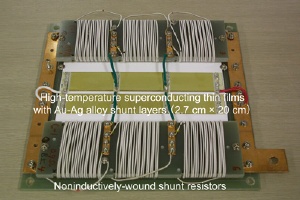Jul 22 2009
Hirofumi Yamasaki of the Superconductor Technology Group, the Energy Technology Research Institute, the National Institute of Advanced Industrial Science and Technology (AIST) and co-workers have developed a unique 500 V/200 A fault-current limiter (FCL) module, using superconducting films. The FCL will be useful in protecting power facilities from potential damage resulting from fault (short circuit) current when numerous distributed generators are introduced in the future.

The FCL element adopts superconducting films prepared by a metal organic deposition (MOD) technique, which was also developed by AIST. The FCL element shows zero resistance under normal conditions, and can withstand a voltage =4 times higher than that conventional devices (using pure gold) of the same length can tolerate, thanks to the high-resistivity gold-silver alloy layers on top of the large-area superconducting oxide films. Cost of FCL will be substantially lowered because the amount of expensive superconducting oxide film needed is reduced to less than one-quarter that for conventional devices.
It has been confirmed that when the module was cooled in liquid nitrogen, a current of 237 A (effective value) flowed with zero electrical resistance. High-voltage switching experiments showed that a prospective fault current of 2.26 kA without the FCL module was instantly reduced to one-third or less, and the module withstood a voltage of =500 V for 5 cycles in spite of its short length of 20 cm. By connecting 8 modules in series, we can construct one phase in a three-phase 6.6 kV/200 A FCL. Based on the results, we now have a good prospect of realizing practical superconducting FCLs (of several kV/several 100 A) characterized by low cost, compactness, low loss, and high-speed switching.
The details of this study will be presented at the Cryogenics Society of Japan Conference to be held in Waseda University on May 13-15, 2009, and at the Technical Meeting on Application of Superconductivity (Institute of Electrical Engineers of Japan) to be held in Kyoto University on June 11-12, 2009.